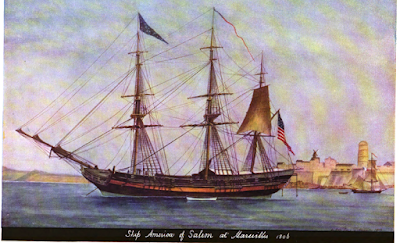Richard Squires
Richard Squires
1791/1792 -Dec 22, 1870
Richard Squires was born in Massachusetts and eventually settled down in Port Washington, New York. In the War of 1812, he formed the Privateers of America in Salem, Mass., and worked for the U.S.N. He continued service up until 1857, and last
served on the U.S.S. Constellation. Altogether, he served 17 years for the U.S.N. and 33 years as a merchant seaman. He was Captain of the forecastle in his last position aboard the Constellation. These men of the forecastle were responsible for handling the headsails and the anchors. These roles were generally reserved for older seamen with less agility. In 1857, Richard Squires received a land warrant from the U.S. Government. These grants were given to veterans of the U.S. Revolutionary War, War of 1812, and Indian Wars. He was able to sell his for $150.00, which is
equivalent to $5000.00 of purchasing power today (C.P.I.). Richard Squires was a widower and had a daughter Dorothy Squire of Ipswich, Massachusetts. Richard Squires came to live at Sailors’ Snug Harbor on May 3, 1859, and was signed in by
Governor Augustus dePayton. He would reside at the Harbor until his death ten years later. Richard Squires is buried in Plot 1, see cemetery map.

The Privateer Ship America from Salem Massachusetts-http://thegibsonhousemuseum.blogspot.com
Richard Squires in the War of 1812 was among many Seamen that would become well equipped as Privateers, serving in the U.S.N., to handle British War Ships within the same class of ship and to take Merchant Prizes. The
Derbys were wealthy Salam Merchants and a Privateering Family. During the War of 1812, the Derby Family donated two Ships, the
Grand Turk and the
Mount Vernon, to the U.S.N. to act as privateers against British Shipping (Butler, 30). The
Crowninshields were another rich Salem family that were privateers and merchants. They donated the America IV, a 473-ton merchantman. America shipped with 23 guns and 150
sailors and became the most successful at taking prizes. During the war, America took twenty-six British ships that sold for more than a million dollars (Butler, 31). By the end of the war, the British and the Americans had lost so much tonnage
of Ships that thoughts were that Privateering played a hand in the
Treaty of Ghent (Butler, 31).

Engraving of Constellation in dry dock, c. 1859
Richard Squires served on the USS Constellation as Captain of the forecastle from July 28, 1855, until 1857. The USS Constellation was under the command of Captain Charles H. Bell (Footner, 257). She departed Portsmouth, Virginia, to meet with
the Mediterranean
Squadron on July 28, 1855 (Footner,246,257). In July of 1856, the USS Constellation stopped at Malaga, Spain, to protect American Nationals during an uprising against the government (Navel History and Heritage Command). Next, the Constellation
came to the aid of a bark in the Sea of Marmara. The Ship received special thanks from the Emperor of Austria (Navel History and Heritage Command). The Ship returned to the New York Navy Yard in 1858 (Footner,257), but Richard Squires seems to
have shipped home prior aboard another ship in 1857 (Richard Squires Registration Page).

USS Constellation 1994
By Stunned Duck - Own work, CC BY-SA 4.0, https://commons.wikimedia.org/w/index.php?curid=97388989
- Ancestry. U.S., War Bounty Land Warrents, 1789-1858, URI:https://www.ancestry.com/search/collections/1165/ .
- Butler, John, A.. Sailing On Friday - The Perilous Voyage Of America's Merchant Marine,Potomac Books, University of Nabraska Press,USA, 2000.
- CPI Inflation Calculator.U.S. Inflation Rate Calculator from 1665 through 2022, URI:https://www.in2013dollars.com/1860-dollars-in-2017?amount=150 .
- Footner, Geoffrey. USS Constellation - From Frigate to Sloop of War, Navel Institute Press Annapolis, Maryland, 2010.
- Forecastle. Wikipedia, the free encyclopedia,URI: https://en.wikipedia.org/wiki/Forecastle
- Gibson House Museum. Taking the Prize: The Privateer Ship America, URI:http://thegibsonhousemuseum.blogspot.com/2016/02/taking-prize-privateer-ship-america.html ,copied image link:2/27/22.
- Naval History and Heritage Command. USS Constellation II (Sloop of War), October 6, 2020, URI: https://www.history.navy.mil/research/histories/ship-histories/danfs/c/constellation-ii.html
- Stunned Duck, CC BY-SA 4.0 (USS Constellation-USS_Constellation_1994),URI: https://commons.wikimedia.org/w/index.php?curid=97388989 , copied image link, 2,27,22.
- Trustees of Sailors Snug Harbor. Richard Squires's Registration Page Snug Harbor,Date Created: August 3 1869 Place: New York (State)--New York--Staten Island, publisher: The Trustees of Sailors' Snug Harbor, The collection is on
permanent loan at the Stephen B. Luce Library of SUNY Maritime College, Digital Origin: Reformatted digital,
URI:https://maritimedigitalcollections.com/Detail/objects/7441 .
- Waud,Mr.. USS Constellation in drydock, Boston - Charlestown-engraving by Charles F. Damoreau,Ballou's Pictorial Drawing-Room Companion, Vol XVI No. 6; Whole No. 398, original created: 5 February 1859, picture made: 15:12, 2 July
2017,URI:https://commons.wikimedia.org/wiki/File:Ballou%27s_USS_Constellation_1859.png , Image link copied, 2/27/2022.


